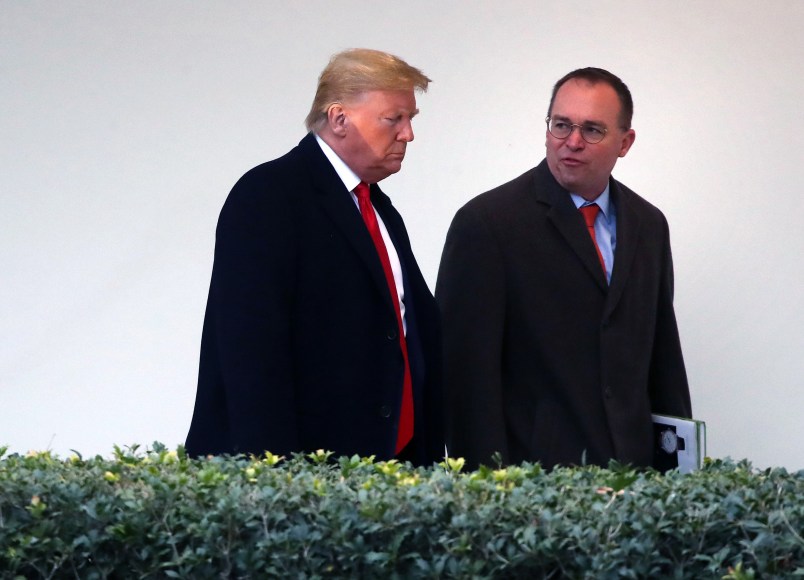This article is part of TPM Cafe, TPM’s home for opinion and news analysis.
When the Obama administration created the Consumer Financial Protection Bureau, it was meant to be the good wolf hunting predatory lenders, scammers and fraudsters intent on fleecing the American people. And indeed, under its first director, Richard Cordray, it was pretty effective, clawing back some $12 billion in ill-gotten gains on behalf of ordinary people.
Naturally, Trump and his gang weren’t into that. I know, I know, I’m as surprised as the next guy that a (so-called) billionaire former casino owner who only paid $750 in income taxes in recent years wouldn’t be serious about protecting working Americans’ money from scammers and abusive lenders, but it’s true. From the very beginning, “various industry actors — payday lenders and others who are subject to CFPB oversight or enforcement actions — were contributing to the Trump campaign and the Trump inauguration committee,” says Lisa Stifler, the director of state policy for the Center for Responsible Lending. As soon as Trump was elected, he began systematically pulling the CFPB’s teeth. Now, the incoming administration has its work cut out for it.
Directors of the bureau serve five-year terms, meaning that the current Trump appointed director Kathy Kraninger theoretically has almost three years left in her tenure. However, on that count, Trump and the GOP may have been hoist by their own petard. The Trump administration, anxious to do away with Director Richard Cordray, an Obama appointee, spent years litigating to gain the ability to fire the head of the CFPB. They eventually won in court, and the CFPB was determined to be a part of the executive branch rather than an independent agency, but by that point, Cordray had already resigned, allowing Mick Mulvaney to take the helm as director in late 2018. That ruling still stands, and it likely means that Biden will be able to fire Kraninger and appoint his own director once he takes office.
Nevertheless, serious damage has already been done. Mulvaney had always hated the bureau, infamously calling it a “joke” in a “sick, sad kind of way,” and systematically sought to undermine its watchdog work as soon as Cordray left. Under Mulvaney and Kraninger, his successor, the amount of money recovered by the CFPB on behalf of citizens dropped from $43 million per week to just $6 million, according to a report by the Consumer Federation of America. Indeed, under Mulvaney and Kraninger, as of the report’s publication in March 2019, the CFPB had only brought two cases related to credit reporting and mortgage lending, one case related to debt collection, and no cases related to student lending, and had “also failed to announce or resolve a single anti-discrimination case.” Unless we believe the nation’s grifters and loan sharks decided to stop work when Trump was elected, the only possible explanation is that Kraninger and Mulvaney systematically ceased pursuing enforcement against them.
Not only did the CFPB not pursue new enforcement actions, they even backpedaled on prior wins, according to a report from the House Financial Services Committee. In the case of Enova International, an online lender that was found to have illegally taken money from debtors’ bank accounts, a settlement had already been reached during Cordray’s tenure under which the company “offered to return approximately $1.4 million to consumers.” Yet, once Mulvaney and Kraninger came in, that went by the wayside, and although a $3.2 million civil penalty — paid to the CFPB itself — was assessed against Enova, zero money was actually returned to consumers. The report blandly states that “Trump’s appointees failed to pursue remedies that would have returned money to victims.”
Fixing the CFPB isn’t something that can wait. The failure of the CFPB under the Trump administration has already jeopardized the financial wellbeing of American consumers and endangers our economic recovery. For instance, according to Stifler, the much lauded $1,200 “Trump checks” — the only government support millions of people have seen during the pandemic — in some cases simply disappeared into the hands of creditors. “For many folks, that stimulus money went straight to a bank account and creditors wiped that money right out of the account to pay off the debt,” she says, adding that payday and title lenders have been explicitly using the pandemic in their marketing materials.
Without a strong CFPB, it’s hard to protect people from these sorts of abusive and exploitative practices. Lastly, beyond appointing a new director, the Biden administration needs to push for the reinstitution of a key payday lending rule which was scrapped earlier this year. The rule made it illegal to grant payday loans — often with triple digit interest — to people deemed unable to repay them. With the arrival of a vaccine and the imminent reopening of businesses, preventing such practices will be critical to the financial wellbeing of households and a healthy economic recovery. The CFPB may have become a toothless bureaucracy under the Trump administration, but it’s time to give it the tools to take on financial predators once more.
Benjamin Reeves is a New York based journalist, screenwriter and media consultant. You can follow him on Twitter @bpreeves or visit benjaminreeves.com to learn more.






